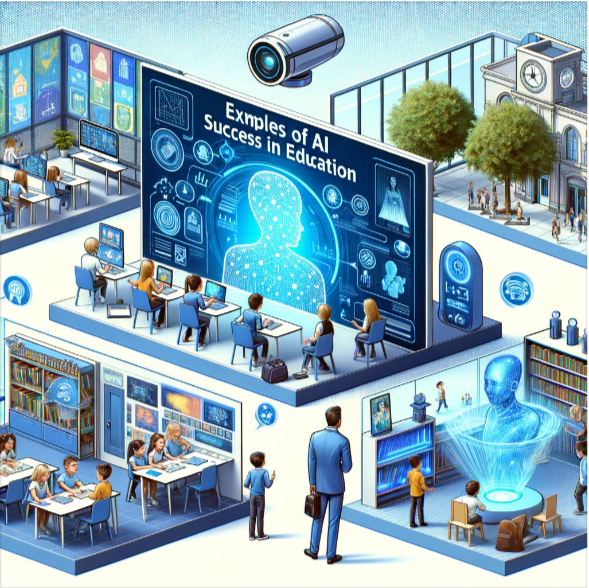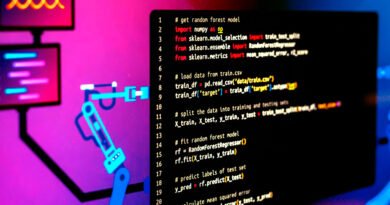Smart Teaching: The Pros and Cons of Integrating AI in Education
Introduction
Artificial Intelligence (AI) is dramatically transforming the educational sector, introducing innovative and effective methods that challenge traditional teaching paradigms. By personalizing learning environments and enhancing accessibility, AI is making education more effective and inclusive. However, the integration of AI in education introduces complex challenges that merit deep exploration. In this article, we will investigate the multifaceted roles of artificial intelligence in education, emphasizing its potential to improve educational outcomes and the ethical dilemmas it poses. Our aim is to illuminate AI’s role not just as a technological tool, but as a pivotal element in the evolution of educational methodologies.

What is AI in Education?
AI in education involves the strategic use of machine learning algorithms and intelligent systems to support and enhance learning processes. It is capable of adapting to the individual needs of students, providing immediate feedback, and creating personalized educational pathways. This makes learning more interactive and effective. We will discuss how AI integrates into educational systems, impacting both learners and educational staff, and transforming pedagogical approaches.
The Evolution of AI in Education
Early Innovations: The History of AI in Education
The inception of artificial intelligence in education dates back several decades when it was first used to enhance administrative functions and support early adaptive learning technologies. These initial applications laid the groundwork for the sophisticated uses we see today, underlining the longstanding recognition of AI’s potential to enhance educational processes.
AI in Higher Education
In higher education, AI plays a crucial role in streamlining administrative processes and scaling personalized learning experiences. This section will delve into specific AI applications that have revolutionized higher education, such as automated grading systems, AI-driven academic advising, and personalized learning paths that adapt to student performance.

Harnessing AI for Enhanced Learning Experiences
Personalized Learning AI
The ability of AI to tailor educational experiences to individual student needs is one of its most significant advantages. By analyzing learning patterns, AI customizes content delivery, thus significantly enhancing learning outcomes. This adaptability ensures that education responds effectively to the diverse learning paces and styles of students.
AI Educational Tools and Learning Platforms
A vast array of AI-enabled tools and platforms now augment the educational experience. These tools include AI tutors, virtual laboratories, and interactive learning platforms that engage students in novel and effective ways. We will explore how these tools are being implemented and their impact on both teaching and learning.
The Benefits of AI in Education
Accessibility and Inclusion
AI technologies have made education more accessible to individuals with disabilities and those from varied linguistic and cultural backgrounds. This technology supports the implementation of universal education standards and promotes inclusive learning environments. We will examine specific examples of AI tools that have facilitated significant advances in educational accessibility and inclusion.
Examples of AI Success in Education
This section will showcase various case studies where AI has significantly improved educational outcomes, demonstrating its effectiveness in real-world educational settings. From AI systems that predict student learning trajectories to platforms that provide real-time assistance, these examples will highlight the practical benefits of AI in education.

The Challenges and Limitations of AI in Education
Cons of AI in Education
Despite its many advantages, implementing AI within education also brings significant challenges, including data privacy concerns, the potential for increasing the digital divide, and the risk of depersonalization in the learning experience. We will discuss these challenges in depth, considering their implications for future educational practices.
Ethical Considerations and Privacy Concerns
The use of artificial intelligence in educational settings raises important ethical questions, particularly concerning data privacy and the potential biases inherent in AI algorithms. This discussion will address these issues comprehensively, exploring strategies for mitigating risks and ensuring ethical use of artificial intelligence in education.
The Future of AI in Education
AI is poised to continue its profound impact on the educational landscape. This section will speculate on future developments in AI technologies and their potential further effects on educational methods and outcomes. We will consider both the opportunities and challenges that these future developments are likely to present.

FAQs
Q1: What are the main benefits of integrating AI into education?
AI revolutionizes education by personalizing learning experiences, increasing accessibility, and offering scalable solutions to educational challenges.
Q2: How can AI improve personalized learning experiences?
AI enhances personalized learning by analyzing individual learning preferences and habits, thereby optimizing the educational process for each student.
Q3: What are the potential risks of using AI in educational settings?
Key risks include data privacy issues, potential increases in educational disparities due to the digital divide, and a reduction in personal interaction in learning environments.
Q4: Can AI replace teachers in the classroom?
AI is unlikely to completely replace teachers but can serve as a significant tool to support the educational process, helping with administrative tasks and providing tailored instruction.
Q5: How does AI contribute to educational equity?
AI can help bridge gaps in educational access and quality, particularly for underserved communities, by offering personalized resources and support.
Q6: What steps are being taken to address privacy concerns in AI-driven education?
Regulatory frameworks and ethical guidelines are being developed and implemented to protect student privacy and ensure fairness and transparency in AI applications.
Conclusion
AI in education represents a powerful instrument with the potential to revolutionize the educational landscape profoundly. By personalizing learning, enhancing accessibility, and preparing students for a technology-driven future, AI acts as a catalyst for significant transformative change in educational methodologies. The key to harnessing these advancements lies in embracing AI’s capabilities while diligently addressing the ethical and practical challenges associated with its integration. These challenges include ensuring data privacy, mitigating biases in AI algorithms, and maintaining human-centric educational practices. With careful and thoughtful integration, AI can greatly amplify educational practices, pushing the boundaries towards a smarter, more inclusive educational environment. As we navigate this evolving landscape, it is paramount that stakeholders from educators to policymakers collaborate to foster environments where AI tools are used responsibly and effectively. Such strategic collaboration will pave the way for a future where education is not only about information delivery but also about holistic development, tailored to each student’s unique needs and potentials.




Pingback: Artificial Intelligence: A threat to humanity or a Hope to humanity? - The Future Web